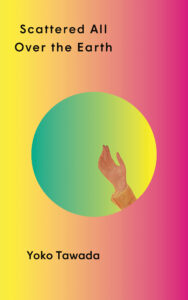
Our treasure chest of terrific reviews this week includes Julian Lucas on Yoko Tawada’s Scattered All Over the Earth, Nathaniel Rich on Jack E. Davis’ The Bald Eagle, Molly Young on Quan Barry’s When I’m Gone Look for Me in the East, Kristen Martin on Sarah Manguso’s Very Cold People, and Laura Miller on Marlon James’ Moon Witch, Spider King.

“According to Yoko Tawada, literature should always start from zero. She is a master of subtraction, whose characters often find themselves stripped of language in foreign worlds … Scattered All Over the Earth imagines a world in which Japan has disappeared. Stranded in Denmark, a refugee named Hiruko searches for fellow-survivors, torn between longing for her mother tongue and the desire to fashion a new one. Her odyssey becomes a fairy-tale test of the commonplace idea that, as one character puts it, ‘the language of a native speaker is perfectly fused with her soul’ … Tawada’s playful and deeply inventive new novel isn’t quite a sequel to The Emissary, but it shares the conceit of a Japan amputated from the world … Tawada applies the same fairy-tale conventions—mistaken identity, unexpected metamorphosis—to the dilemmas of finding linguistic shelter in a world of rising seas and ceaseless migration … Tawada has always had a talent for ventriloquizing eccentrics, following singular minds through fugue and limbo. Scattered All Over the Earth departs from this model by introducing a team of such characters—a shift from exploring the inner worlds of linguistic displacement toward Babel-like allegory. As metafiction, it succeeds brilliantly, sketching a grim global dilemma with the sort of wit and humanism that Italo Calvino, in a discussion of lightness in literature, described as ‘weightless gravity.’ But the novel occasionally falters in its efforts to imbue the characters with psychological depth; splitting the difference between a high-concept fairy tale and a realist novel is a hard trick to pull off … What might it look like, she asks, if the heroes of our myths weren’t founders of nations but stateless castaways, inventors of motherless tongues?”
–Julian Lucas on Yoko Tawada’s Scattered All Over the Earth (The New Yorker)
“Davis’s most surprising contribution is to show how adulation of the natural world can accelerate its destruction. We came very close to loving the bald eagle to death … That we didn’t—that we spared the species from extinction and even appear to have restored its population to its pre-republic size—is the source of the book’s bouncy optimism. The Bald Eagle is the rare natural history that plays as a comedy. It’s a dark comedy, however, because its lessons are not easily transferable to our broader, ongoing ecological catastrophe. The bald eagle is not only a symbol of American might. It is a symbol of American exceptionalism … The Bald Eagle is a shaggy dog. It proceeds by the principles of accretion, with no eagle fact, or eagle-adjacent fact, left behind … From the trivia, however, emerges a moving portrait of a species victimized for its own evolutionary successes … Davis makes the subtle but persuasive point that the ubiquity of eagles in American culture…made individual animals seem expendable.”
–Nathaniel Rich on Jack E. Davis’ The Bald Eagle: The Improbable Journey of America’s Bird (The Atlantic)
“Mesmerizing and delicate … The novel takes the familiar form of a quest. Along the journey there is an accident, a self-sacrifice, disasters, death. There are natural wonders and metaphysical conundrum … When I’m Gone, Look for Me in the East is a wild departure from Barry’s previous novel, the fizzy and maniacal We Ride Upon Sticks … The new novel centers on faith, history, language and yearning … [Barry] has taken a giant leap forward as a novelist … This one is a dazzling achievement. Form and subject matter combine in the book to alter a person’s very reading metabolism: The rhythms are more like prayer than prose, and the puzzlelike plot yields revelations in unassuming sentences that a skimming eye could easily miss …The novel brims with formal peculiarities seemingly designed to cultivate alertness—and they do …Chronological games abound. Phrases repeat throughout the text. Chuluun’s narration shimmers between several time frames. The entire novel is written without the use of the past tense … All of this technical sorcery might make it sound as though Barry has written an exhausting book, but reading it is no more demanding than walking on soft grass …The unlikeliness of this novel is exactly its magic.”
–Molly Young on Quan Barry’s When I’m Gone Look for Me in the East (The New York Times)
“Though we follow Ruthie through the mid-1980s and early 1990s as she comes of age, trudging forward through frozen winters and bored summers, there is not much of a plot in this novel in the sense of cause and effect. We rarely stay in a scene for more than three pages at a stretch, and most of Manguso’s paragraphs are shorter than eight typed lines; the pages breathe with ample white space. Chapters are organized less around major events that propel the narrative forward than loose themes—class tensions, maternal cruelties, middle school anxieties, the ubiquity of sexual assault and intergenerational trauma—illustrated by snapshots of Ruthie’s memory. That’s to be expected. You don’t come to a writer like Manguso looking for plot but for distillation, those moments of perfect capture … Fiction allows Manguso a measure of freedom within her tightly constrained style, an ability to explore the haunting violences of Wellesley—its obsession with its own whiteness and the power that clings to its original settlers; its rigid class structures; its icy emotional restraint; its refusal to acknowledge what happens to the girls who are stuck within its ten square miles—with more truth than a strict adherence to fact would afford … Manguso is an utterly unsentimental writer, and there is no true thawing of these cold people or this cold place. Which is exactly as it ought be in her first novel—a sharp icicle, like the ones Ruthie eats in winter because they are ‘a primal thing that could not be bought.’ ”
–Kristen Martin on Sarah Manguso’s Very Cold People (The Baffler)
“James’ Dark Star trilogy lands solidly in the grimdark camp, but the publication of Moon Witch, Spider King makes his contribution to the genre even more evident. As with Black Leopard, Red Wolf, and as befits a winner of the Booker Prize, this novel’s prose style, inspired by the grammar of African languages, has an intoxicating swagger and energy … where Martin invigorated the epic fantasy genre by liberating it from the customary, quasi-Christian good vs. evil storyline, the Dark Star trilogy leaves what has actually happened in doubt, making it a function of who does the telling. This is a tricky strategy when writing fiction set in a world so fundamentally unlike the one we know. Black Leopard, Red Wolf and Moon Witch, Spider King can be disorienting and confusing books whose narratives jump around in time and treat such bizarre phenomenon as lightning vampires as if they need little explanation. Their difficulty will (and has) put off some readers, but for those who persevere, the two novels show how who you are shapes the kind of story you tell about the world around you, a world made new with every teller.”
–Laura Miller on Marlon James’ Moon Witch, Spider King (Slate)


